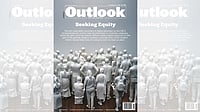The Group of Seven leading democratic economies has formally launched at its annual summit a global infrastructure and investment partnership aimed at pushing back China's influence in the developing world.
The G-7 programme responds to China's so-called Belt and Road Initiative, which Western officials have long argued traps receiving countries in debt and with investments that benefit China more than their hosts.
The White House says the initiative seeks to leverage USD 200 billion in U.S. investment over the next five years, along with a similar amount from G-7 allies, to boost infrastructure development in lower- and middle-income nations.
It adds that most of the funding will come from the private sector, sovereign wealth and global development funds, rather that direct taxpayer dollars.
The U.S. says the G-7 backed effort promotes responsible investments that aim to benefit the communities they are made in.
Among the first initiatives are a USD 2 billion solar farm investment in Angola in Southwest Africa, USD 320 million for hospital construction in Ivory Coast, in West Africa, and USD 40 million to promote regional energy trade in Southeast Asia.
In a jab at China, European Commission President Ursula von der Leyen said the G-7 is offering “sustainable, quality infrastructure” and will be “listening closely to the recipient countries.”






.png?w=801&auto=format%2Ccompress&fit=max&format=webp&dpr=1.0)















